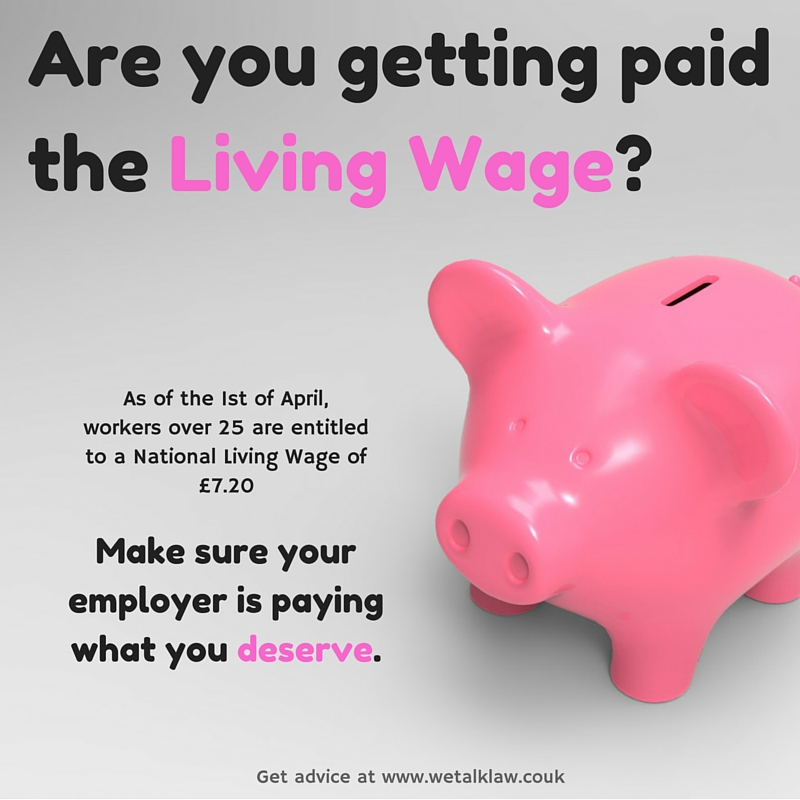The National Living Wage

As of the 1st of April, the Government’s new National Living Wage will be introduced to UK Employment Law. The new rate applies to all working people aged 25 and over, and will be set at £7.20 per hour. To ensure you’re getting paid the right amount, below we’ve provided all the information on the Living Wage that you need to know.
Who will be entitled to the National Living Wage?
The National Living Wage applies to all those who are 25 years old and over and are already covered by the National Minimum Wage. These include:
- employees
- most workers and agency workers
- casual labourers
- agricultural workers
- apprentices who are aged 25 and over
In the meantime, the current National Minimum Wage for those under the age of 25 will continue to apply. See below for rates.
The difference between the National Living Wage and the Living Wage
This new National Living Wage is different from the Living Wage, which is an hourly rate of pay that is updated annually by the Living Wage Foundation, an independent organisation. The Foundations calculates the Living Wage on basic cost of living in the UK. The Living Wage is actually voluntary for UK employers.
What do employees need to do?
It’s the employer’s responsibility to ensure that all workers over 25 are receiving the Nation Living Wage, so technically you don’t need to do anything. However, we would recommend having a conversation with your employer to check they’re aware of the new Wage, and that the change will be reflected in your pay from the 1st of April.
Employers and the National Living Wage
In the eyes of Employment Law, it’s up to the employer to pay workers the right rate. If you run a business, we would advise notifying all staff over 25 that you are aware of the changes and that your company will be paying the National Living Wage from now on. This will help ease any worries and keep your staff updated.
Penalties for failure to comply
With the introduction of the National Living Wage comes a new penalty for non-payment. It will be set at 200% of the amount owed, unless the arrears are paid within 14 days.
The maximum fine for non-payment of the National Living Wage will be £20,000 per worker. Unfortunately, employers who fail to pay will be banned from being a company director for up to 15 years.
The difference between the National Living Wage and the Living Wage
The new National Living Wage is different from the Living Wage, which is a suggested hourly rate of pay, updated annually. The Living Wage is set independently by the Living Wage Foundation and is calculated on the basic cost of living in the UK. Employers can choose to pay the Living Wage on a voluntary basis.
National Minimum Wage
The National Minimum Wage is the minimum pay per hour most workers are entitled to receive, according to UK Employment Law. The rates are based on a worker’s age or whether they are in an apprenticeship. The rate usually changes in October each year, however in 2017 this will change to April.
The rates from 1 October 2015 are:
- £6.70 per hour for 21-24 year olds
- £5.30 per hour for 18-20 year olds
- £3.87 per hour for 16-17 year olds
- £3.30 for apprentices under 19 or 19 or over and in the first year of apprenticeship
In October 2016 the new rates will be:
- £6.95 per hour for 21-24 year olds
- £5.55 per hour for 18-20 year olds
- £4 per hour for 16-17 year olds
- £3.40 for apprentices under 19 or 19 or over and in the first year of apprenticeship
Get some advice
If your employer isn’t paying you the new National Living Wage, then you can do something about it. Call We Talk Law to get the advice you need to fight your case on 0203 002 4898.
Or, if you’re an employer, and want to find out more about your obligations, we also work with businesses. Send us a message on our contact page.
